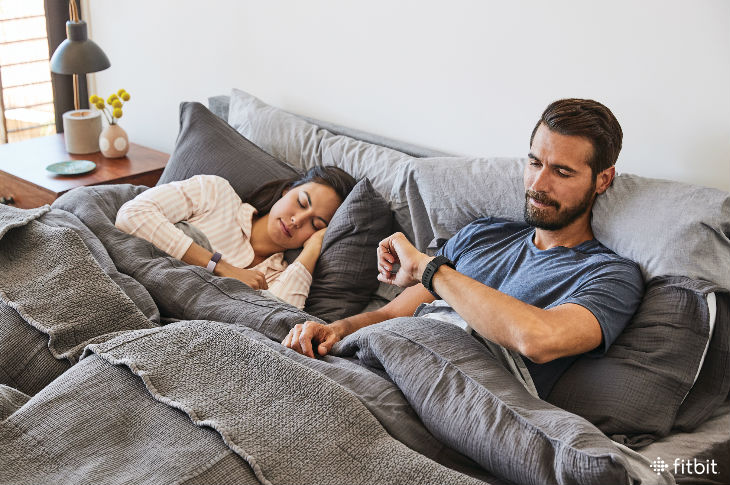
It’s not just you; there’s scientific research on why it is harder to get out of bed in the darker, colder months. Discover the physiological ways your body, brain, and environment are stacked up against you when it comes to leaving bed on winter mornings.
Your room is so dark. You want your bedroom to be dark to help you fall asleep, but now that dark room makes it harder to leave bed in the morning. “If it’s still dark when you wake up, your melatonin production will not stop as easily, making it difficult to wake up,” says Terry Cralle, RN, Clinical Sleep Educator. “Exposure to light early in the day provides feelings of wakefulness, alertness, and energy.” You’re also missing vitamin D from the sun in the winter. “Lower levels of vitamin D can also impact serotonin production in the body, which affects our sleep-wake cycle and mood,” says Cralle. Chat with your doctor about whether you should take a vitamin D supplement.
Your melatonin production has changed. Your body produces the sleep hormone, melatonin, as it gets darker out, setting you up to fall asleep at night. But since you’re not exposed to the early morning light in the winter—a cue for the body to stop melatonin secretion—it’s harder to wake up in the morning. “Melatonin is produced for a longer time in winter when the nights are long,” says Cralle.
Your room is cold. No one wants to get out of bed on frigid mornings. “One physical reason is that colder temperatures are conducive for sleeping, since the body’s internal temperature drops as it prepares for slumber,” says Cralle. Have your heat kick on about 15 minutes before you wake up to make it easier to ditch the comforter.
You’re lethargic and moody. Vitamin D also helps stabilize mood, so if you’re not getting enough of this vitamin through natural sunlight or a supplement, you may be feeling grumpier and tired all season long. Feeling down, unmotivated, and having sleep problems could be indicators of seasonal affective disorder (SAD) and something to talk to your healthcare provider about.
You’ve been ditching your workout. “One of the things that really affects our sleep is exercise,” says Cralle. Exercising during the day is very important for sleep. If exercise falls to the wayside during the winter months, that’s going to lead to poor sleep at night, and you’re going to be less alert, less energized in general, and have a harder time waking up if you didn’t sleep well the night before.
Working out in the winter will take an adjustment, but you have to reframe it. Remember how great regular exercise makes you feel and how it helps you improve sleep at night. If you used to be an outdoor morning runner, you may have to run inside on a treadmill at that time, or, go out during lunchtime or the afternoon. “If you can tie in exercise and sunshine together, that will help regulate your body’s natural clock, so you feel more energized during the day and sleep better at night,” says Cralle.
How to Motivate Yourself to Leave Bed on Cold, Dark Winter Mornings
Use a natural sunrise alarm clock: These wake-up light alarm clocks work by gradually increasing in brightness over a preset time before going off and can make it easier for some people to wake up.
Put your alarm on the other side of the room: We get it; getting out of your cozy bed is one of the hardest parts. “But if you hit your snooze button a few times in the morning, you’re playing mind games and screwing up valuable sleep time,” says Cralle. If your alarm is blaring and it requires you walking a few feet to turn it off, you might be less likely to return to bed. Take it one step further and place the alarm next to workout clothes you set out the night before as a reminder of your intentions to exercise.
Sign up for a morning workout class and prepay: For many of us, losing money is a big instigator to ensure we’re following through on earlier commitments. Sign up for a morning workout class that will charge you whether you show up or not. It can be a great motivator to leave bed.
Keep warm slippers or socks nearby: It’s tough to set foot on a cold floor, so make the transition out of bed easier by easing into warm, cozy slippers, or fuzzy socks as soon as your feet hit the floor. Also note that wearing socks to bed might help you fall asleep faster, too.
Open curtains or blinds to let natural light in: “Morning light in the first part of the day helps keep your body clock in sync and makes it easier to fall asleep at night,” says Cralle. If it’s not light at that hour where you live, you might want to use a light box to get some crucial vitamin D and reap mood-boosting benefits of light therapy.Chug water: Keep a large water bottle by your bed and start drinking as soon as you wake up, or at least before your first cup of coffee. “Drinking water as soon as you wake up will help stimulate the body and help you stay awake,” says Cralle.
The post Here’s Why It’s So Hard To Get Out Of Bed On Winter Mornings appeared first on Fitbit Blog.
source https://blog.fitbit.com/winter-motivation/
No comments:
Post a Comment